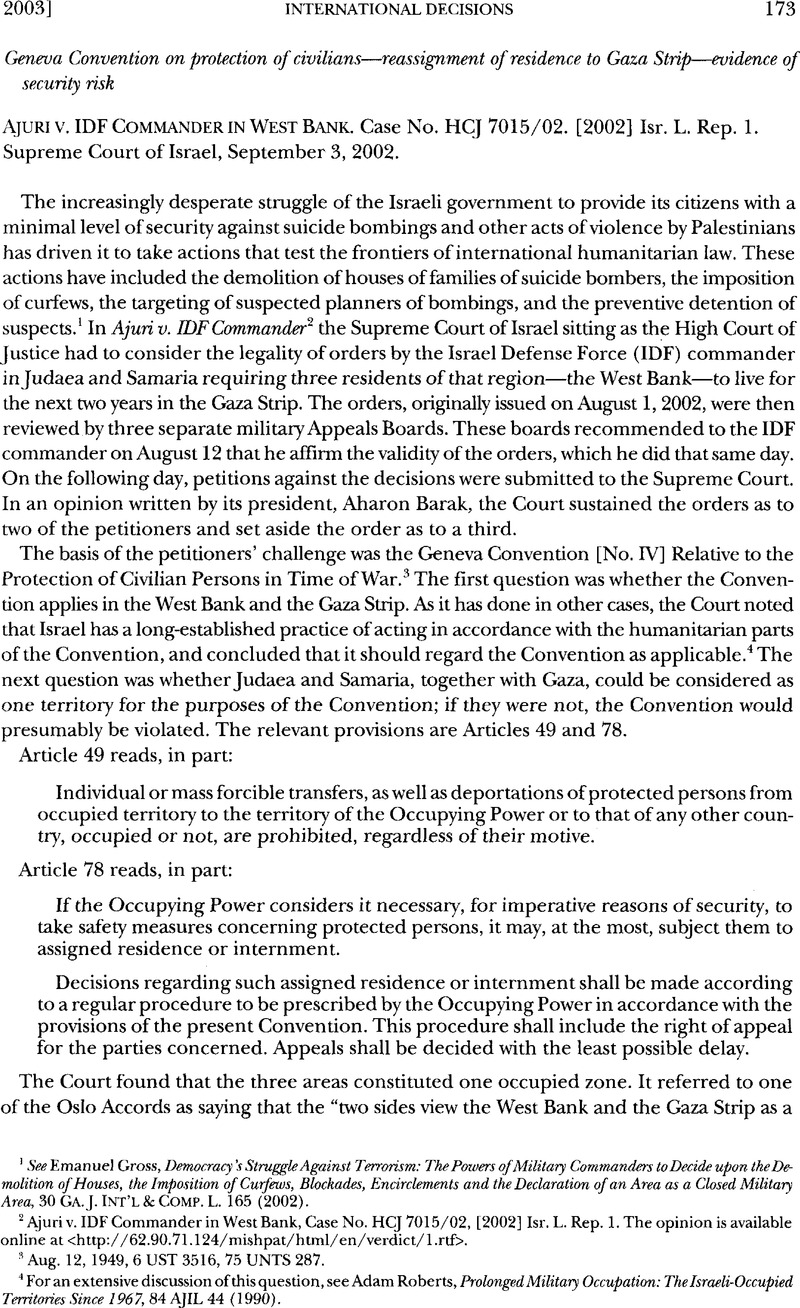Published online by Cambridge University Press: 27 February 2017

1 See Gross, Emanuel, Democracy’s Struggle Against Terrorism: The Powers of Military Commanders to Decide upon the Demolition of Houses, the Imposition of Curfews, Blockades, Encirclements and the Declaration of an Area as a Closed Military Area, 30 Ga. J. Int’l & Comp. L. 165 (2002)Google Scholar.
2 Ajuri v. IDF Commander in West Bank, Case No. HCJ 7015/02, [2002] Isr. L. Rep. 1. The opinion is available online at <http://62.90.7l.124/mishpat/html/en/verdict/l.rtf>.
3 Aug. 12, 1949, 6 UST 3516, 75 UNTS 287.
4 For an extensive discussion of this question, see Roberts, Adam, Prolonged Military Occupation: The Israeli-Occupied Territories Since 1967, 84 AJIL 44 (1990)CrossRefGoogle Scholar.
5 Israeli-Palestine Liberation Organization, Interim Agreement on the West Bank and the Gaza Strip, Sept. 28, 1995, 36ILM 551, quoted in [2002] Isr. L. Rep. at 18. Although both sides have claimed material violations on the part of the other, they apparently regard the agreement as still in force.
6 The Court particularly relies on Uhler, Oscar M., Coursier, Henri, et al., The Geneva Convention Relative to the Protection Of Civilian Persons in Time of War: Commentary 256-57, 367–68 (Picteted, Jean S.., Griffin, Ronald & Dumbleton, C. W. trans., 1958)Google Scholar.
7 Deuteronomy 24:16, quoted in [2002] Isr. L. Rep. at 20.
8 [2002] Isr. L. Rep. at 23.
9 Id. at 21.
10 Id. at 25. For a review of evidentiary questions in other Israeli security actions, see Gross, Emanuel, Human Rights in Administrative Proceedings: A Quest for Appropriate Evidentiary Standards, 31 Cal. W. Int’1 L. J. 237 (2001)Google Scholar. For an explanation of Judge Barak’s philosophy of judicial review of military decisions in a broader context, see Barak, Aharon, A Judge on Judging: The Role of a Supreme Court in a Democracy, 116 Harv. L. Rev. 16, 156–60 (2002)Google Scholar. He concludes that” [j]udicial review of the legality of the war on terrorism may make this war harder in the short term, but it also fortifies and strengthens the people in the long term. The rule of law is a central element in national security.” Id. at 158.
11 [2002] Isr. L. Rep. at 32.
12 See Ex parte Endo, 323 U.S. 283, 302 (1944).
13 Geneva Convention [No. III] Relative to the Treatment of Prisoners of War, Aug. 12,1949, Art. 5,6 UST 3316, 75 UNTS 135.
14 See Padilla v. Bush, 02 Civ. 4445 (MBM), 2002 U.S. Dist. LEXIS 23086 (S.D.N.Y. Dec. 4, 2002) (ordering that supposed unlawful combatant be allowed to communicate with counsel but indicating wide scope of presidential discretion).